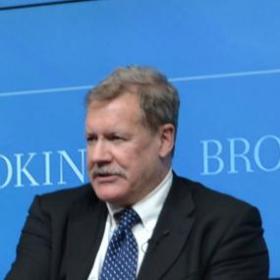
Your Food Prices: That World is Changing Too
In his weekly column for New Europe, Greg Austin investigates the recent inflation in global food prices and asks if the G20 can curb rising prices.
Do not take your food prices for granted. Expect more volatility in pricing than you have ever seen in Europe (if you were born after 1945). The market rules are changing.
The IMF, the World Bank, the G20 and leading NGOs have all issued warnings of one sort or another in recent weeks and months. Of course, their focus has been varied. But the overarching message is that global food markets are now being affected by the most important fundamentals of the human economy: speculation and confidence. In such an environment, the power of the old market rule of supply and demand fades quite dramatically.
According to Bob Zoellick, President of the World Bank, speaking on 15 February: “The Bank’s Food Price Index shows food prices are now 29 percent higher than they were a year ago and only three percent below the peak of the last food crisis in June 2008.” He went on to say: “Global food prices are now at dangerous levels.” There are one billion people going hungry every day, and the trend is not good.
The International Business Times identified three sources of food price inflation: speculation and hoarding; excess liquidity that is driving speculation in the commodities market; and the fact that “agriculture/livestock is one of the most heavily subsidized, protected, and distorted markets in the world”. Europe and the United States are among the biggest offenders on this last front. As for speculation, some leading economists reject this as a cause but whatever the cause, the volatility is troubling most countries.
France as Chair of the G20 is looking to tame the speculation in commodities but with the hope it can be done without regulating prices: “What we would like to do … is try to reduce volatility by simply shining a light on market fundamentals”, Christine Lagarde, Minister of the Economy for France said last week. On 17 February, The Jakarta Post reported Indonesia’s position, typical of developing countries views: “We want the G20 forum to put pressure [on the markets] so there would be no speculators, or any financial or non-financial industries, who speculate on food commodities.” Indonesia’s Finance Minister Agus Martowardarjo, called on G20 to “tell global financial and non-financial industries not to speculate on food and commodities”.
But the faith placed by so many in the G20 may well be misplaced. The EU’s own Security Studies Institute, in a joint intelligence assessment with the United States National Intelligence Committee in September 2010, under the title “Global Governance 2025”, concluded that international institutions were faltering in the face of increasingly more complex global problems. The report noted one view that “the G-20 is essentially a crisis management tool which already suffers from a sense of fatigue”.
If the G20 wants a reformed global order for food and commodity prices, they will need to gain legitimacy for that by helping to deliver new solutions with new partners. As the joint U.S./E.U. assessment referred to above noted, states and intergovernmental organizations now share power and responsibility with non-state actors and many of those, including business and civil society organizations, are proving their capacity to successfully address global challenges in ways that government actors had failed to do.
In the area of food security, and your food prices at home, here in Europe, what shape will that new action coalition of the private sector, civil society and government take in order for you to have confidence in the continued supply of food to your supermarket? How high is your confidence that the national government or the European Commission has a plan to respond to a global shock in the food supply? No need to panic yet, but the warning has been given.

